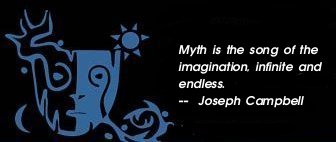|

A New Step toward a Green Planet:
Environmental Problems and Hopes
by William G. Doty
 My way of heading into a topic of research, writing, or teaching is to look at many introductory articles and books, gather bibliographic chains of references, and then plow through library holdings and websites and historical overviews such as de Steiguer's, The Origins of Modern Environmental Thought. Therefore, setting out to ground a new seminar for the Blount Undergraduate Initiative on the University of Alabama/Tuscaloosa on "Ecological Issues and Speculative Fiction/Film," I began to track the influences of some of the ecologically and environmentally important volumes that had attracted me over the years since the 1950s when I was in college, and then into the 60s and 70s. My way of heading into a topic of research, writing, or teaching is to look at many introductory articles and books, gather bibliographic chains of references, and then plow through library holdings and websites and historical overviews such as de Steiguer's, The Origins of Modern Environmental Thought. Therefore, setting out to ground a new seminar for the Blount Undergraduate Initiative on the University of Alabama/Tuscaloosa on "Ecological Issues and Speculative Fiction/Film," I began to track the influences of some of the ecologically and environmentally important volumes that had attracted me over the years since the 1950s when I was in college, and then into the 60s and 70s.
Here were especially Aldo Leopold's A Sand County Almanac; Edward Abbey's trickster crew in a novel, The Monkey Wrench Gang; Rachel Carson's exposé of the long-term danger of pesticides, The Silent Spring; Ralph Nader's Unsafe at Any Speed; and forays back to Thoreau's Walden; even the thought of Adam Smith and Thomas Malthus.
The issues have become predominantly Natural Science, I assumed, and indeed I found many technical volumes in our Eric and Sarah Rodgers Library for Science and Engineering, shelved according to the Library of Congress classification subject call numbers beginning with the letters HQ. Most are highly technical microstudies about the indicator status of a particular frog species, proposals for watershed regulations, or — closest to where my academic training began, in botany — analyses of overpopulation stresses upon habitats of various bromeliads.
Here in Science & Engineering I discovered just how complex ecological studies have become, and how technical. For example, by the thirteenth page in an introductory textbook, Essentials of Ecology, Townsend et al., students are introduced to mathematical probability theory and the sort of statistical analysis I always had to review while teaching Psychology of Religion courses (remember correlation coefficient? or chi rho squared?).
 More and more I began to realize that one reason I was attracted to the topic was because it had repeatedly been a venue for one of the main emphases of most of my academic career, namely working across the disciplinary strait jackets of academia — that is to say, in multi- and interdisciplinary bailiwicks. Today several of the large number of traditional disciplinary approaches are sharing some of the new terms and concepts in the crossing fields of focus: especially chaos theory (now preferably called complex systems science), biosphere, biomes, biodiversities, biocentrism, flux, post-natural world, sustainability, ecotage, ecomodernism, depletion quotas, and such jawbreakers as "interspecific competition and community structure." More and more I began to realize that one reason I was attracted to the topic was because it had repeatedly been a venue for one of the main emphases of most of my academic career, namely working across the disciplinary strait jackets of academia — that is to say, in multi- and interdisciplinary bailiwicks. Today several of the large number of traditional disciplinary approaches are sharing some of the new terms and concepts in the crossing fields of focus: especially chaos theory (now preferably called complex systems science), biosphere, biomes, biodiversities, biocentrism, flux, post-natural world, sustainability, ecotage, ecomodernism, depletion quotas, and such jawbreakers as "interspecific competition and community structure."
Having devoted most of my academic energies in the humanities and social sciences realms, I soon realized how many years of study would be needed now to feel somewhat competent in these "hard" natural-science areas, although admittedly, there are sociological, economic, even psychological tangents in any of them. And in my scoping of the last four or five decades of works in ecology and in environmentalism (the two were earlier-on confused, but no longer), I realized how important economic and political vectors have been in these decades, wherein our civilization has begun to regard nature not merely as something to be conquered, mastered, dominated, but as part of a continuum stretching from rocks to baby-in-the-cradle.
A recent collection edited by Lodge and Hamlin, Religion and the New Ecology, establishes that religious and moral-ethical attitudes are much more influential than earlier natural scientists were likely to believe. (See also Loy, who points to The Market as the most powerful religion of today, and to the collection edited by David Lodge, Religion and the New Ecology, which sets out explicitly to go beyond Lynn White's blaming of Western religions for our eco-disaster.)
Attitudes, perspectives, and mythic images began to loom large here just as they have in most of my teaching and writing. Drinnon's Facing West: The Metaphysics of Indian-Hating and Empire Building, or other similar works on the function of the frontier in American consciousness, or Nash's blockbuster Wilderness and the American Mind, provide ready access to the religio-mythological attitudes in place in this nation. (Smith's Virgin Land and Slotkin's Regeneration are especially fruitful, as is a work on ecocriticism edited by Carmichael.)
The influential Social Construction of Reality by Berger and Luckmann, and Kuhn's Structure of Scientific Revolutions emphasize the way disciplinary paradigms — read technical terminologies, scientific assumptions, and above all, funding allotments — are what establish scientific truth, just as the financial market replaces religious divinities. (See Flowers deeply insightful "Practicing Politics in the Economic Myth" and Loy's "The Religion of the Market".)
In the course of my seminar preparation, I finally came across references to such views as deep ecology, environmental ethics, and moralities of land use and means of evaluating societies and natural resources-use beyond Gross National Product statistics. Assumptions of a constantly-expanding market capitalism have only price signals for the rich, none for the poor: "The poor experience a very different reality, but in a market economy their experience doesn't count" (Korten 33).
 Wessels's The Myth of Progress: Toward a Sustainable Future demonstrates clearly how hugely approaches toward environmental health have bought into economic models and neglected lessons to be learned in almost any natural science introductory course. He disses our standard myths of Control, Growth, Energy, the Free Market, and Progress, calling, as most of the most liberal environmentalists do, for a profound change in our entire culture's attitudes, hopes, and expectations. Wessels's The Myth of Progress: Toward a Sustainable Future demonstrates clearly how hugely approaches toward environmental health have bought into economic models and neglected lessons to be learned in almost any natural science introductory course. He disses our standard myths of Control, Growth, Energy, the Free Market, and Progress, calling, as most of the most liberal environmentalists do, for a profound change in our entire culture's attitudes, hopes, and expectations.
Precisely what to measure and how to make comparative judgments takes us precisely into economics and environmental ethics, and I discovered whole new shelves of library volumes on these topics. As a contributor to the Encyclopedia of Religion and Nature, I should not have been surprised, I suppose, but it was interesting to me to see that — beyond the Gaia hypothesis, the metaphysical Deep Ecology, and various neo-Buddhist all-is-all discussions — environmental ethics has been a very hot topic variously discussed in terms of moral values as well as highly-technical discourses in contemporary schools of academic philosophy. (Many books are listed by LCC under "human ecology," GF80.)
These are absolutely issues with which philosophy has grappled since Socrates, Aristotle, and Aquinas. Desjardins's Environmental Ethics is a comprehensive overview of all the various ways ecological and environmental studies have engaged philosophical issues. His examples of issues discussed (or fought over!) are always excellent, and his end-of-chapter discussion questions highlight the great range of ambiguities present in any decision; nearly every segment demonstrates the necessity to move slowly and consider the widest ramifications for the future. (What if future Terrans don't desire wilderness? What is our responsibility to the planet now in order to grant them some of the freedoms we have enjoyed?) I can only imagine hot class discussions, because fundamental freedoms and values are interpreted from a huge number of different perspectives today (note Simmons, Interpreting Nature, on the question of perspectives and constructions of meaning).
Values today have to be reasoned, both with respect to hoary cultural values of the past, and with respect to whether contemporary and future situations demand re-appropriation of these values, new post-foundationalist critical perspectives. Many assumptions still made, such as what is natural, falter before what is actually the historically-contexted social construction of particular worldviews and mythologies. And certainly assumptions of capitalist agendas that have taught us isolation from community and the impossible-to-realize dream of having every commercial commodity available in our own home space begin to seem not only shoddy, but, probably to a great extent, responsible for the trashing of this green planet.
While the Green Movement has been more visible in Europe than in the States, Andrew Dobson's The Green Reader provides an excellent selection of extracts that documents where this more proactive side of things has been developing. Here again there is a good sense of historical development of confrontations of transnational problems around limits to growth, population explosion, third world poverty, bioregionalism, ecofeminism, even ecosocialism, and green conservatism.
I have not listed all the ills of the current approach to, and use of, our planetary environment: surely most people recognize the incipient disaster, often referred to as The Sixth Extinction, even if they do not know where to turn to try to keep it from happening. There cannot be many citizens who do not recognize that change, radical change, and soon, represents the only (if any is possible) solution. The huge volume edited by Alex Steffen, Worldchanging, takes us beyond despair toward a new model; "We need to consciously redesign the entire material basis of our civilization." That sounds like what happened, thanks to versions of The Whole Earth Catalogue, and appropriating in homage, Worldchanging: the subtitle echoes A User's Guide for the 21st Century. the subtitle echoes A User's Guide for the 21st Century.
This nearly 600-page volume (marvelously designed, illustrated, and laid out) will both lift spirits as it demonstrates repeatedly just how much change is already occurring. It revives hope that there is hope if we collectively and individually begin, one step at a time, to talk and plan together, reduce our carbon print, our massively out-of-balance expenditure of resources in contrast to the have-not worlds. (The have-its are consuming something like 80% of the earth's resources, though they constitute merely 20% of world population). It revives hope that there is hope if we collectively and individually begin, one step at a time, to talk and plan together, reduce our carbon print, our massively out-of-balance expenditure of resources in contrast to the have-not worlds. (The have-its are consuming something like 80% of the earth's resources, though they constitute merely 20% of world population).
You'll recognize the saying, "A journey of a thousand miles begins with a single step." The challenge to us all is to step out, now.
Works Cited
- Abbey, Edward. 1975. The Monkey Wrench Gang (P.S.)
 (1975; Harper Perenn. Mod. Classic ed. 2006). (1975; Harper Perenn. Mod. Classic ed. 2006).
- Berger, Peter L., and Thomas Luckmann. 1966. The Social Construction of Reality: A Treatise in the Sociology of Knowledge
 . Garden City NY: Anchor. . Garden City NY: Anchor.
- Carmichael, Deborah A., ed. 2006. The Landscape of Hollywood Westerns: Ecocriticism in an American Film Genre
 Salt Lake City: University of Utah Press. Salt Lake City: University of Utah Press.
- Carson, Rachel. 1962. Silent Spring
 . Boston: Houghton Mifflin. . Boston: Houghton Mifflin.
- Desjardins, Joseph R. 2006. Environmental Ethics: An Introduction to Environmental Philosophy
 . 4th ed. Belmont CA: Thomson-Wadsworth. . 4th ed. Belmont CA: Thomson-Wadsworth.
- de Steiguer, J. E. 2006. The Origins of Modern Environmental Thought
 . Tucson: University of Arizona Press. . Tucson: University of Arizona Press.
- Drinnon, Richard. 1980. Facing West: The Metaphysics of Indian Hating and Empire Building
 . Minneapolis: University of Minnesota Pres. . Minneapolis: University of Minnesota Pres.
- Flowers, Betty S. 2000. "Practicing Politics in the Economic Myth." The San Francisco Jung Institute Library Journal 18/4: 59-66.
- Korten, David C. 2000. "Sustainability and the Global Economy." Visions of a New Earth: Religious Perspectives on Population, Consumption, and Ecology
 . Ed. Harold Coward and Daniel C. Maguire. Albany: State University of New York Pres; 24-42. . Ed. Harold Coward and Daniel C. Maguire. Albany: State University of New York Pres; 24-42.
- Kuhn, Thomas S. 1970 (1962). The Structure of Scientific Revolutions
 . 2nd ed. Chicago: University of Chicago Press. . 2nd ed. Chicago: University of Chicago Press.
- Leopold, Aldo. 1949 (spec. commem. ed. 1989). A Sand County Almanac: And Sketches Here and There (Outdoor Essays & Reflections)
 . New York: Oxford Uuniversity Press. . New York: Oxford Uuniversity Press.
- Lodge, David M., and Christopher Hamlin, eds. 2006. Religion and the New Ecology: Environmental Responsbility in a World in Flux. Notre Dame: University of Notre Dame Press; 15-28.
- Loy, David R. 2000. "The Religion of the Market." Visions of a New Earth: Religious Perspectives on Population, Consumption, and Ecology
 . Ed. Harold Coward and Daniel C. Maguire. Albany: State University of New York Press. . Ed. Harold Coward and Daniel C. Maguire. Albany: State University of New York Press.
- Nader, Ralph. 1965. Unsafe at Any Speed: The Designed-In Dangers of the American Automobile
 . New York: Grossman. . New York: Grossman.
- Nash, Roderick. F. 2001 (1967). Wilderness and the American Mind. 4th ed. New Haven: Yale University Press.
- Simmons, I. G. 1993. Interpreting Nature: Cultural Constructions of the Environment
 . New York: Routledge . New York: Routledge
- Slotkin, Richard. 1973. Regeneration Through Violence: The Mythology of the American Frontier, 1600-1860
 . Middletown: Wesleyan University Press. . Middletown: Wesleyan University Press.
- Smith, Henry Nash. 1950. Virgin Land: The American West as Symbol and Myth. Cambridge: Harvard University Press.
- Steffen, Alex, ed. 2006. Worldchanging: A User's Guide for the 21st Century
 . New York: Abrams-La Martinière Groupe. (Note the very active website out of which this grew, which remains quite alive on several fronts: WorldChanging.com.) . New York: Abrams-La Martinière Groupe. (Note the very active website out of which this grew, which remains quite alive on several fronts: WorldChanging.com.)
- Townsend, Colin R.; John L. Harper; and Michael Begon. 2000. Essentials of Ecology
 . Malden MA: Blackwell Science. . Malden MA: Blackwell Science.
- Wessels, Tom. 2006. The Myth of Progress: Toward a Sustainable Future
 . Burlington: University of Vermont Press. . Burlington: University of Vermont Press.
William Doty, Ph.D. is Professor Emeritus of Humanities and Religious Studies at the University of Alabama and former editor of Mythosphere: A Journal for Image, Mythi, and Symbol (Vol. 1 Issue 1) . Dr. Doty is a prolific writer, translator, and editor who has published more than twenty books and seventy essays in a wide range of journals on topics including religious studies, anthropology, psychology, classics, and art criticism. His best known books include Mythography: The Study of Myths and Rituals . Dr. Doty is a prolific writer, translator, and editor who has published more than twenty books and seventy essays in a wide range of journals on topics including religious studies, anthropology, psychology, classics, and art criticism. His best known books include Mythography: The Study of Myths and Rituals , Myths of Masculinity , Myths of Masculinity , and Myth: A Handbook , and Myth: A Handbook . .
Read more articles in this series by Dr. Doty
Return to Passages Menu
Subscribe to the Passages e-zine
|

